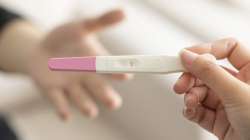Earliest symptoms of pregnancy can be as common as cramps and spotting, know more
The most reliable way to confirm a pregnancy is a blood test at the doctor’s clinic, but since the wait is too vexing for most women, they resort to noticing the symptoms their body may project. Since 5 DPO is too early for a reliable pregnancy test result, these are the earliest symptoms that may indicate a pregnancy.

Women trying to conceive often find themselves counting the days past ovulation (DPO). That’s when the infamous two-week wait begins in pursuit of the two pink lines on the pregnancy test. Women are advised to wait 15 days before taking a pregnancy test because the results are most accurate at 15 DPO. While the most tell-tale sign of a pregnancy is a missed period, women may experience symptoms as early as 5 DPO. Since every pregnancy is unique, the symptoms may or may not occur 5 DPO and the intensity of these symptoms also differs from woman to woman.
The most reliable way to confirm a pregnancy is a blood test at the doctor’s clinic, but since the wait is too vexing for most women, they resort to noticing the symptoms their body may project. Since 5 DPO is too early for a reliable pregnancy test result, below are the earliest symptoms that may indicate a pregnancy.
Cramps
One of the most common 5 DPO symptoms is mild cramps. Women may experience cramping in their pelvis, lower back or abdomen. They are similar to light menstrual cramps and happen as a result of implantation. When the fertilized egg attaches itself to the uterus lining, it is known as implantation. These cramps are a body’s response to a foreign entity that is the fertilized egg.
Bleeding or Spotting
As a consequence of implantation, women may experience early bleeding or spotting at 5 DPO. The flow of the bleeding is lighter than that during periods and so is the colour. Bleeding early in the first trimester is common and not always a source of worry. About 15 to 25 percent of the women may notice mild bleeding, spotting or a brown discharge around 5 DPO.
Nausea or Morning Sickness
Another symptom women may notice 5 DPO is nausea or vomiting. Morning sickness is common for most women during the first trimester. The majority of pregnant women experience nausea or vomiting until after a few weeks, but some may experience it early and shouldn’t be concerned.
Mood Swings
During pregnancy, the body is flooded with hormones and goes through significant changes in hormone levels. As a result of these changes, women may be vulnerable to mood swings. Hormone fluctuations may cause them to be emotional or moody. Mood swings can occur as early as 4-5 DPO and tend to continue throughout the pregnancy.
High Basal Body Temperature
A lot of women track their basal body temperature to know when they’re ovulating as it increases during ovulation. However, the basal body temperature may remain elevated after ovulation. In case the temperature continues to stay high after ovulation, it may be an indication of early pregnancy.
Food Cravings or Aversions
A common symptom that lasts through a woman’s pregnancy and may begin around 5 DPO is food craving. Many women develop specific food cravings during their pregnancy and may strongly desire its taste or aroma. Just as women may feel the urge to eat some foods, they may also experience specific aversions. Certain foods or smells may cause them to lose their appetite or feel nauseous.
Key Takeaways
Pregnancy can be an exciting and emotional journey for women and most women cannot wait for the journey to begin. They look out for symptoms and signs to indicate pregnancy and these symptoms can occur as early as 5 DPO. Implantation cramps, bleeding, nausea, mood swings, food cravings or aversions, high basal temperature, fatigue or breast tenderness are some of the early symptoms women tend to experience in days past ovulation. While these symptoms may offer hope to women trying to conceive but as each pregnancy is unique, these symptoms differ and may or may not occur. The surest and most reliable way of confirming a pregnancy is a blood test and women must wait at least 11-12 days for it.
(The author is Dr Sheetal Sachdeva (MBBS, DGO, DNB, Consultant Obstetrics & Gynecology, Apollo Cradle & Children’s Hospital, New Delhi- Moti Nagar))
(Disclaimer: The opinions expressed in this article are those of the author. They do not reflect the views of India TV)